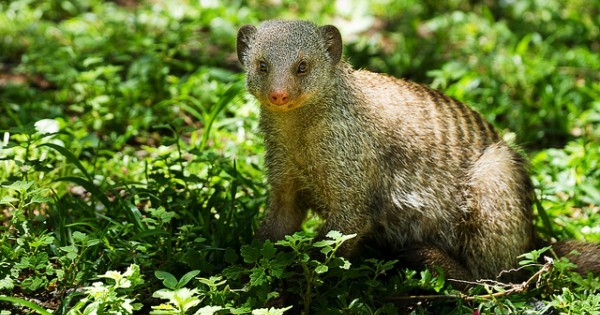
Dad is sad. The new baby is crying, and dad feels overwhelmed: trapped, isolated, empty, or out of control. Although he loves the child and had planned to be involved in the baby’s care, he instead feels like a zombie. Some 10 percent of fathers experience such postpartum depression, according to a 2010 report in the Journal of the American Medical Association. Paternal PPD is often seen in conjunction with maternal postpartum depression (which affects some 10 to 30 percent of mothers) and may be linked to fluctuations in the man’s hormones during pregnancy and after: testosterone falls, while estrogen and cortisol—a stress hormone—rises.
Human dads are not alone: banded mongoose dads also experience pre- and postpartum stress, and a new study on these wild African mammals shows that the stress is linked to a rise in those stress hormones. That increase, the study shows, makes a mongoose less likely to invest in future progeny.
Jenni Sanderson, of the Centre for Ecology and Conservation at the University of Exeter in the south of England, spent almost two years studying a population of about 350 banded mongooses (in Latin, Mungos mungo) living in 10 to 12 groups in Uganda’s Queen Elizabeth National Park. “Banded mongooses are incredibly social and cooperative; they are also [very unusual] within cooperative breeders in that all of the females breed synchronously (they actually all give birth on the same day!),” Sanderson said to me in an email.
The animals also share some unusual living arrangements. Large communal litters of mongoose pups are cared for by all adults in the group, both male and female. Because mongoose moms are often simultaneously pregnant and caring for pups, Sanderson and her colleagues chose to study only male caregivers, whose job is to “escort” a single foraging mongoose pup for six weeks until it becomes independent. “The escort plays with, feeds, carries, protects and general[ly] cares for that single escorted pup for the whole period of offspring care,” Sanderson wrote. Among animals, this behavior is unique to banded mongooses, she said.
Sanderson and her colleagues trained individual animals to step onto a scale every morning to be weighed before foraging; she also collected a total of 432 fecal samples for hormone analysis. I was curious how she collects mongoose poop, but Sanderson said it is very simple: “We just pick it up from the ground straight after the mongoose has produced it, put it in a small plastic bag, and then store it in a chilled flask until we get back to the office”—the Wildlife Endocrinology Lab at Chester Zoo near Liverpool—“and can put it in a freezer.” Each mongoose, she added, has a unique pattern shaved onto its back, “which allows us to identify individual mongooses and know whose feces is whose.”
Analysis of the stress hormones in the mongoose excreta showed that those with high concentrations prior to breeding were less likely to invest in their pups, and those with low stress hormone concentrations prior to care were more likely to take care of the offspring. “We have also shown that caring for offspring leads to an increase in stress hormones—which means that individuals who invest heavily are then less likely to invest in a second breeding attempt (if there is only a small time between care periods),” Sanderson said. Or, as she was quoted in a press release on the research: “Everybody knows that your past can affect your future.”
This could or could not explain why human parents often spend time in agonizing debate as to whether to add another child to their family after coping with the first or second. But I’ll admit that I had another motive for reading this study: one of my favorite grammatical jokes concerns a confused zookeeper who debates the plural of mongoose—is it mongooses or mongeese?—and then writes that he is shipping “one mongoose, and also another mongoose.” Now that I have read about Sanderson’s research, I know that the animal’s name has no relation to goose or geese: it is based on the Indian Marathi language word for the animal, mangus. The correct plural is mongooses.


